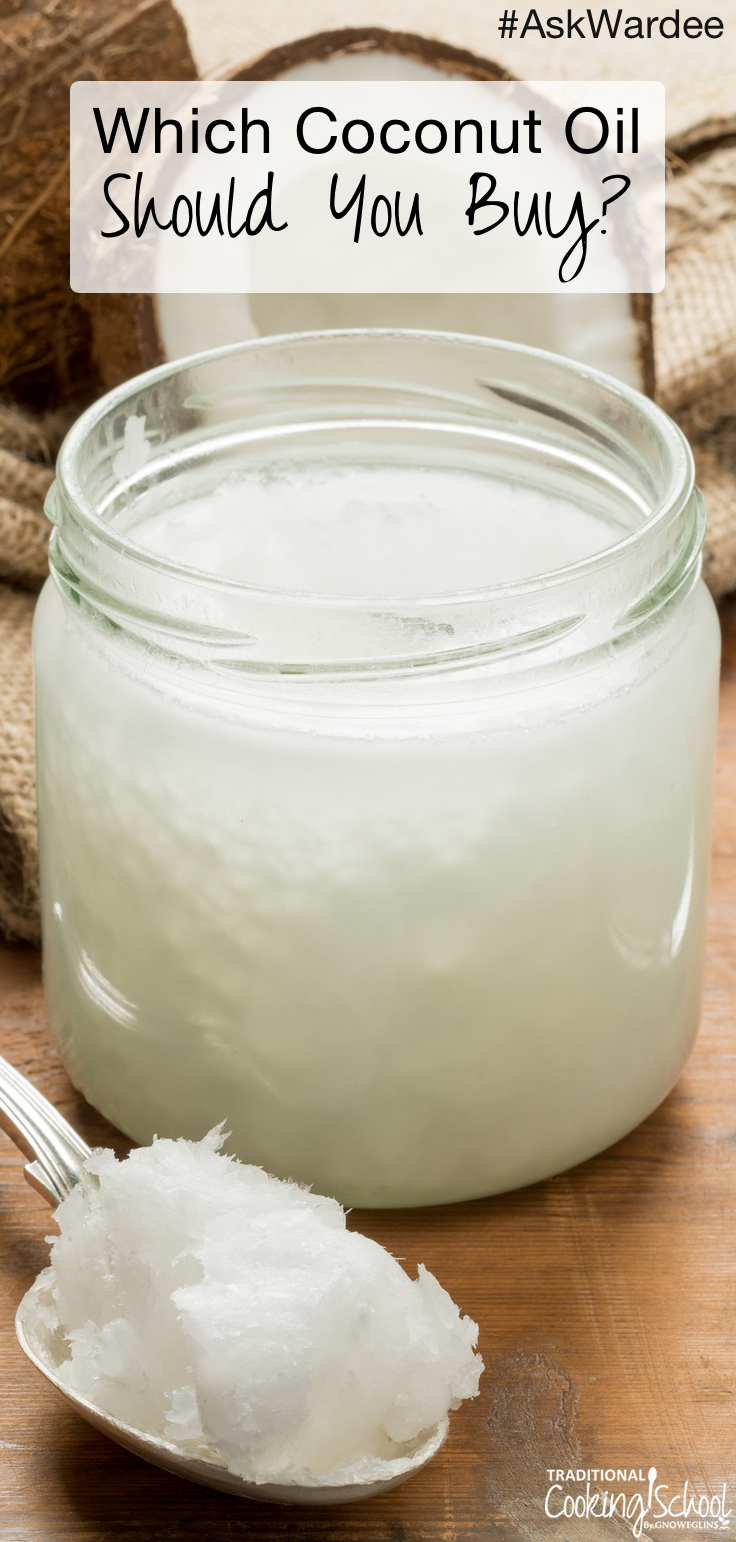
Refined, unrefined, virgin, centrifuge extracted, cold-pressed, expeller-pressed…
…those are all descriptions you might see when shopping for coconut oil.
Ready to pull your hair out yet???
No need! It’s really not that complicated, even though it might seem like it now. 😉
On today’s #AskWardee, let’s talk about the types of coconut oil so you can choose the right one(s) for your needs.
We will get to the bottom of it, I promise!
I broadcast #AskWardee live each Wednesday at 10am Pacific (1pm Eastern) on Periscope and Facebook Live. Both the podcast and video replay of this week’s show are below. Enjoy!
Subscribe to #AskWardee on iTunes, Stitcher, YouTube, or the Podcasts app.
The Question: Which Coconut Oil Should You Buy?
Marie N. asks:
I’m so confused! Everyone says coconut oil is amazing, and I really want to use it. Except whenever I start shopping for it, I’m overwhelmed by all the types — refined, unrefined, centrifuge, expeller, virgin, ??? Which one should I choose and why?
My Answer:
Before I give you the quick and easy answer, let’s first get on the same page…
What’s Important?
In my kitchen, I’m always balancing 2 things — foods as healthy as possible while still being a flavor/taste that everyone loves.
When you’re talking about coconut oil, it’s generally true that the less refined the oil, the healthier it is — and the coconut flavor is stronger. (Although if you have special needs — like frying — the least refined is not the best oil to choose for that purpose; see below.)
We tend toward using the least refined coconut oil because of the health benefits. Also, we like the flavor of coconut (though I agree it doesn’t always go). Others may want to use a more refined oil to end up with a more neutral flavor.
There is no wrong answer here — provided you start with quality oils from a quality company. The brand we use most often is Wilderness Family Naturals. Even their more refined/less coconut-y oils are still healthy!
You may have to try a few coconut oils in different applications to find out what you or your family likes.
Ok? Ready to go through the types of coconut oil?
These are in order from most refined to least refined (and it’s a given that we’re discussing organic versions of each type…).
1. Refined Coconut Oil (Expeller-Pressed)
Clean, neutral flavor suitable for high heat cooking, baking, and frying. Not raw. Choose organic. Least expensive.
Coconut oil that’s “refined” means it’s gone through a process that removes coconut flavor, aromas, and impurities.
According to Wilderness Family Naturals in their Decoding Coconut Oil Labels article:
Organic coconuts are opened and quickly dried. These dried coconuts are then mechanically pressed to remove the oil. No chemical solvents are used at any time during the process. Any free fatty acids in the oil are removed. Next, the oil is run through diatomaceous earth and finally, steam distilled.
The resulting oil is pure and neutral in both taste and aroma. It is commonly sold as expeller-pressed coconut oil. It’s ideal for baking, sautéing, frying, and cooking and is usually the most budget-friendly type of coconut oil.
That is generally how refined (or expeller-pressed) coconut oil is made. Wilderness Family Naturals adds an additional filtering step so it’s even cleaner and more mild in flavor.
This type of oil is not raw (because it’s been exposed to heat during processing), and it’s usually the least expensive option. Also, it’s the most versatile — it can be filtered and reused in your own kitchen because of it’s high heat stability.
2. Virgin, Unrefined, Cold Pressed Coconut Oil
Stronger coconut flavor suitable for medium-heat cooking (plus baking and body care). Raw. Choose organic.
Even though no heat or chemicals are supposed to be used in this extraction process, some companies do use higher heat which results in a toasted coconut taste, or worse — burnt or rancid flavors.
What’s actually supposed to happen? According toWilderness Family Naturals in their Decoding Coconut Oil Labels article:
First, [fresh] coconut meat is grated and dehydrated. This drying process is important to the taste and quality of the oil. Then, the dried coconut is gently pressed at varying degrees of pressure and temperature. No heat or chemicals are used in this process.
This cold-pressing (if actually done at low temperatures as Wilderness Family Naturals does) preserves the coconut flavor of the coconut oil. Many describe it as a pleasantly mild coconut flavor, though sensitive individuals may find it’s too strong.
Because of it’s low moisture content, this coconut oil has a long shelf life.
3. Centrifuge Extracted Coconut Oil (Also Virgin)
Light coconut flavor suitable for raw applications such as smoothies, cereal, or right off the spoon; can also be used in cooking or body care. Raw. Choose organic. Not widely available; most expensive.
According to Wilderness Family Naturals in their Decoding Coconut Oil Labels article:
Centrifuge-extracted coconut oil is made by first pressing the fresh, white coconut meat to obtain coconut cream. This cream is approximately 40% oil. The pressing should be done on a special machine where both the pressing plate and the sleeve are cooled by chilled water.
Next, the cream is concentrated, using a centrifuge, to yield a higher and higher percentage of oil while the proteins and water soluble substances are separated out. All moisture, fiber, and proteins can be removed without the use of heat.
Wilderness Family Naturals carefully monitors the temperature to see that it never exceeds 104 degrees Fahrenheit — so it’s truly raw. Then, they add an additional filtering step so it’s even cleaner and more mild flavored.
Which To Choose?
To sum it up for you…
Always go for organic (it’s a given with anything I’m linking here).
If your family prefers a mild flavor above all else, choose expeller-pressed (refined) or cold pressed (virgin).
For high heat frying or baking, choose expeller-pressed (refined). The others don’t do as well at high temperatures.
For eating raw or for the most health benefits, choose centrifuge-extracted or cold-pressed (in that order of preference).
If you want a high-quality coconut oil for crafts such as candles, soaps, deodorants, and body butters, use centrifuge-extracted or cold-pressed. But, if money is an issue, Wilderness Family Naturals carries this craft oil that contains sediments (so people prefer not to eat it). It’s still super high quality, but priced low because it hasn’t been cleaned up and filtered.
Helpful Links:
- Refined (Expeller-Pressed) Coconut Oil — least coconut flavor, best for baking and high-heat frying
- Raw, Cold Pressed, Virgin Coconut Oil — very mild coconut flavor, best for using raw for health benefits, great for skin
- Centrifuge Extracted Virgin Coconut Oil — mild but present coconut flavor, extra filtered, most health benefits, best for using raw
- Craft Coconut Oil — not suitable for eating but is an economical option for making lotions, candles, body butters, and soaps
- 21 Ways Coconut Oil Can Clean, Pamper, & Nourish Your Body From Head To Toe
- Homemade Coconut Butter (+3 flavor options!)
- No-Bake Salted Caramel Cookie Dough Bites
- Paleo Chocolate Chip Cookie Brownies
- 3 Homemade Coconut Oil Deodorant Recipes
- Whipped Body Butter With Essential Oils
- 10 Reasons To Use Coconut Oil + 33 Recipes!
- Southern Coconut Cream Pie
- Red Palm Oil from Wilderness Family Naturals — makes great just-like-the-theater popcorn!
What’s your coconut oil of choice and why? Please share your thoughts and advice in the comments!
...without giving up the foods you love or spending all day in the kitchen!

2 free books:
Eat God's Way
Ditch the Standard American Diet, get healthier & happier, and save money on groceries...
We only recommend products and services we wholeheartedly endorse. This post may contain special links through which we earn a small commission if you make a purchase (though your price is the same).


Wardee, have you baked/cooked with coconut syrup or do you know if that can be done? Thanks! Have a blessed day.
Hi M.,
Yes, it can be used in recipes calling for liquid sweeteners like honey or maple syrup. It works well and tastes yummy!
~Millie, TCS Customer Success Team
I want to use in hair and on skin. What brand do you recommend. Thank you
Hi Meg,
There’s a paragraph in the article for other uses:
“If you want a high-quality coconut oil for crafts such as candles, soaps, deodorants, and body butters, use centrifuge-extracted or cold-pressed. But, if money is an issue, Wilderness Family Naturals carries this craft oil (https://wildernessfamilynaturals.com/products/craft-oil-certified-organic/?ref=4) that contains sediments (so people prefer not to eat it). It’s still super high quality, but priced low because it hasn’t been cleaned up and filtered.”
So your choice as to which one. Wilderness Family Naturals is our chosen brand. 🙂
~Millie, TCS Customer Success Team